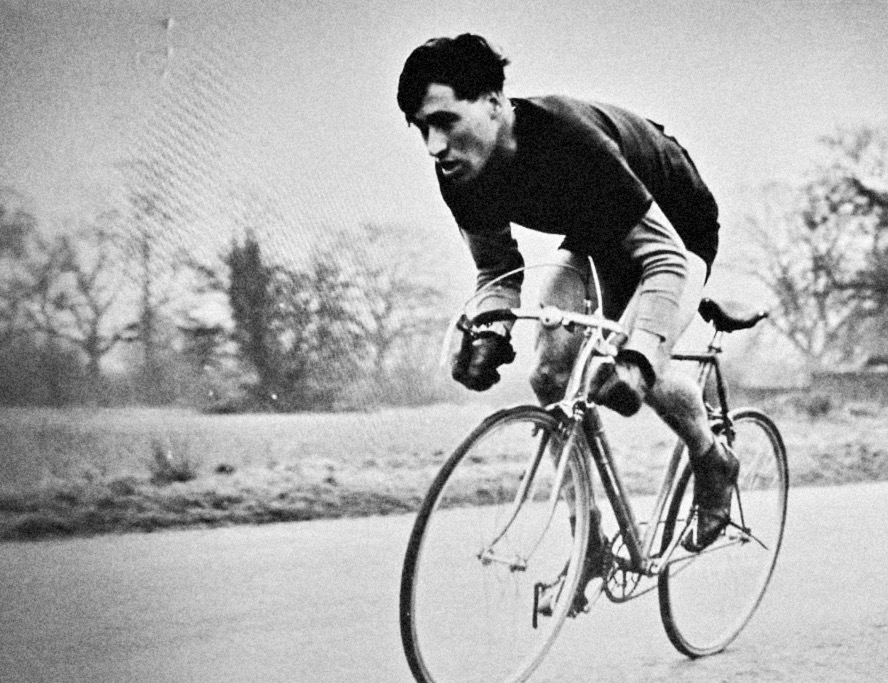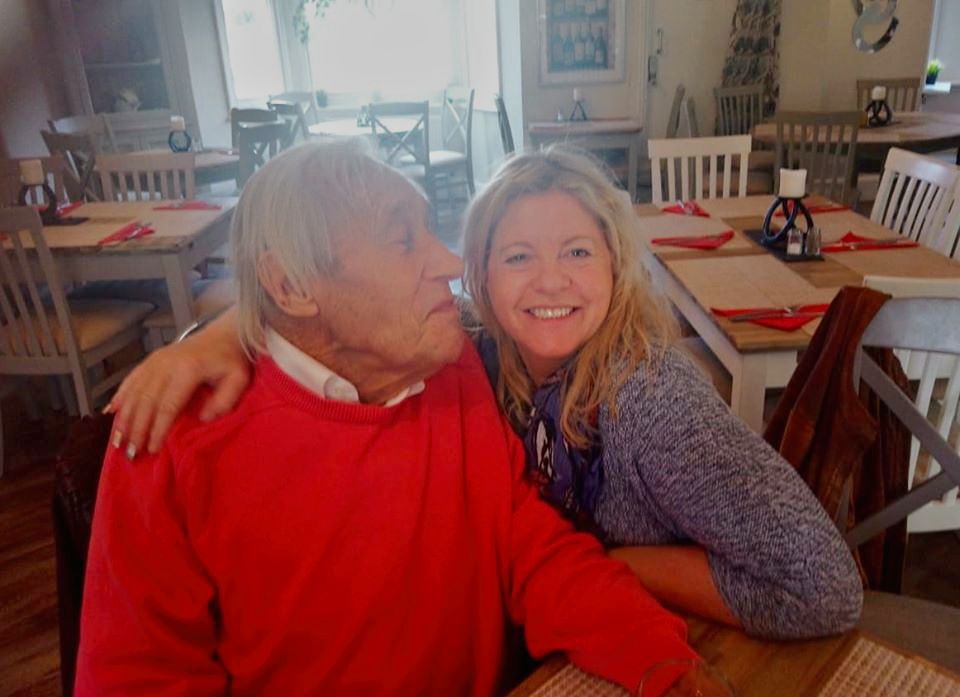Harry Hampson wasn’t a man that VeloVeritas knew personally but we knew of him from the many mentions of his name in the ‘Cycling Weekly’ in the days when the magazine was the main reporting organ for cycle sport in the UK.
And when Mr. Hampson died recently we were struck by the outpouring of emotion from the men he mentored/coached, ‘back in the day.’
We felt it only right that we should pay tribute to a man who touched the lives of so many riders.
* * *
Olympic medallist and a man who has featured in the pages of VeloVeritas in the past, Rik Evans was Harry Hampson’s nephew so it’s only fitting we should open our tribute with his words:
“Many of you will have already heard the sad news about the passing of my uncle – the incomparable and legendary Harry Hampson.
“I received the news late last night (Eastern Australian time) when my sister called me.
“I’d already turned in for the night and was a bit dopey, so I wasn’t about to get up and start posting on Facebook.
“Today’s a new day though, and I’ve had a little time to reflect on Harry’s life and the impact that he had on others.
“There’s a lot to reflect upon, and I won’t attempt a detailed eulogy here.
“Suffice to say for now though, Harry was an exceptional person.
“In particular – and as most of you will know – he was a gifted mentor and motivator. In this role he was a stand-alone individual who both challenged and arguably beat the establishment. He was proud of that fact, but it has to be said that he did feel a strong sense of injustice at being shunned by ‘the system’.
“Never mind, he lived a full life and reached a ‘good age’ as they say.
“‘Life is for living!’ was a favourite adage of his, and he backed-up this sentiment with his regular wining, dining and sun-worshipping trips to France, his countless home soirees (great cooking!) and his general ‘bon vivant’ approach to life.
“Long before evolving into his role as mentor, he was a vital figure in the thriving club scene of the 1950s, both as a racer and organiser.
“He’s pictured here in what looks like an early season ITT.

“He cut a striking figure in those days; an athletic, handsome devil with a twinkle in his eyes.
“He still had that right up to the end – the twinkle in the eyes, that is … the other picture here shows him working his charm with the landlady at The Three Horseshoes pub, Knockholt, Kent – that was only last year. She adored him.

“Harry Hampson, without doubt a one-off. He will be missed.”
* * *
Pip Taylor was a trackman of note back in the 70’s and is another man who paid tribute to Harry Hampson.
“Harry Hampson built himself an enviable reputation as one of this country’s greatest rider mentors/managers and life coaches.
“The list of champion riders he produced is extensive and includes many UK National Champions across all age groups on both road and track. It extends to World Championship level both amateur and professional and to multiple medallists at the Commonwealth Games and the Olympics.
“I can’t remember how I got to know Harry Hampson; I was a junior track rider from Slough and the West London Division. I was making the transition from racing locally in the ‘small pool’ of Reading track to those ‘biggest and most challenging of track pools,’ Paddington and Herne Hill.
“My Chiltern RC club-mate Mick (Champ) Bond may have mentioned this legendary cycling guru from South London to me.
“Harry turned out to be this urbane character who produced an endless crop of classy South London race winners who had an aura of confidence about them that I had not seen before.
“I first encountered this South London ‘production line of talent’ at my first National Track Championships in 1970 at Leicester. The UK Junior Sprint Championships was won by Harry Hampson’s protege Dave Carter with Alan Upcraft second.
“Harry wasn’t a tracksuit-wearing or BCF blazer-wearing coach and his approach was considered unconventional by many, especially the BCF establishment; he was sophisticated with a permanent, real tan, not gained in Bromley.
“He was respected but often appeared to operate on the periphery of the Herne Hill and the other velodrome venues officialdom but was at the core of the rider activity.
“Harry had an MGB roadster, he often wore his business clothes when trackside and he was a handsome devil, a dealer with a wicked glint in his eye.
“In the mid 70’s Harry offered to help me and I visited him a few times to gain his advice. Rather than taking an interest in my bike position, prescribing monstrous mileage or brutal interval regimes, like other coaches I had met had done before him, he talked of the need for muscle definition, conditioning and morale. He had an ability to get a rider to stretch beyond what they perceived as their natural limits.
“He gave you belief. By example he told me before a race at Crystal Palace, that ‘I don’t want you to finish the race tonight, you keep attacking until you get dropped.’ I dished it out and of course he knew I would not get dropped and I got a very high placing even against the senior riders. Rik Evans and I beat a huge field of seniors on another occasion with me still on junior gears.
“Harry had an amazing ability to help so many riders. He did so in his own time and at his own cost and together with his compatriots took many riders to events across the UK and in Europe. Many of these riders were my rivals from my peer group but he was discrete and never let on who he was helping and he never discussed their strengths and weaknesses in front of me.
“In fact I have only just begun to realise how many he helped and that includes fellow West Londoner, Steve Heffernan (I could have done without him doing that looking back!).
“Harry became what I believe to be, the unpaid acting National Track coach in the wake of Norman Sheil who had gone to Canada. He maintained the focus on the Team Pursuit and ran many sessions at Leicester and Herne Hill until he was snubbed by the Establishment. Despite his somewhat ‘soft psychological approach’ he could be hard and decisive even with riders he was helping.
“Along with many others I have a lot to thank him for including my appreciation of red wine and the music of Lou Reed, the Velvets and David Bowie.
“RIP Harry Hampson, you were an Ace.”
* * *
We could have run with many other words of tribute but since former National ‘25’ Champion and record holder, successful trackman and roadman as an amateur and professional, Dave Bonner contacted VeloVeritas we thought we should run his words as our third tribute.
“I first met Harry Hampson in 1959 as a 16 year-old, he took me under his wing, coached me and drove me to races.
“I used to visit his house at Catford and then in Farnham; there were so many top guys of that era used to meet at his place – Dave Carter, Reg Smith, Reggie Barnett, Ron Keeble…
“But it wasn’t just about cycling, he loved his evenings out, usually a Sunday where he’d teach us about food and wine.
“He had such enthusiasm for helping young cyclists, not just to better riders but to be better people.
“He was always at the Herne Hill track, either as an official or helping riders.
“Perhaps my fondest memory of him is when I won the National ‘25’ – my mum said that he rode the race with me, he didn’t relax until my last turn of the pedals.”
* * *
Harry Hampson, coach, mentor and liver of life, rest in peace.



